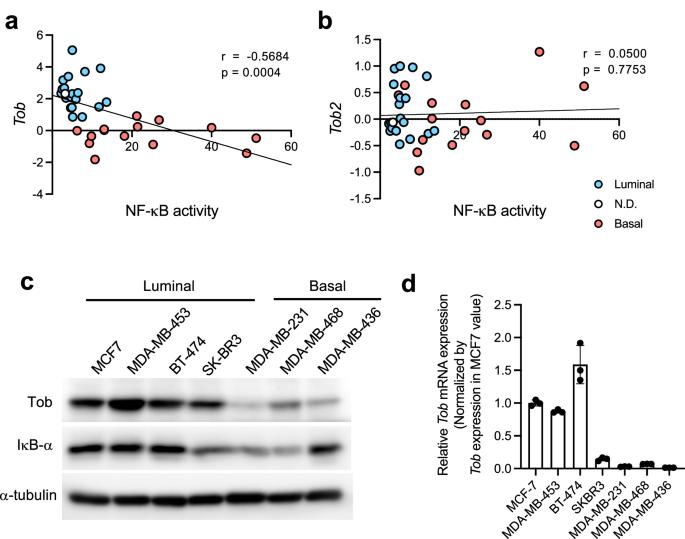Tob negatively regulates NF-κB activation in breast cancer through its association with the TNF receptor complex
IF 5
3区 医学
Q1 BIOTECHNOLOGY & APPLIED MICROBIOLOGY
引用次数: 0
Abstract
NF-κB mediates transcriptional regulation crucial to many biological functions, and elevated NF-κB activity leads to autoimmune and inflammatory diseases, as well as cancer. Since highly aggressive breast cancers have few therapeutic molecular targets, clarification of key molecular mechanisms of NF-κB signaling would facilitate the development of more effective therapy. In this report, we show that Tob, a member of the Tob/BTG family of antiproliferative proteins, acts as a negative regulator of the NF-κB signal in breast cancer. Studies with 35 human breast cancer cell lines reveal that Tob expression is negatively correlated with NF-κB activity. Analysis of The Cancer Genome Atlas (TCGA) database of clinical samples reveals an inverse correlation between Tob expression and NF-κB activity. Tob knockdown in human breast cancer cells promoted overactivation of NF-κB upon TNF-α treatment, whereas overexpression of Tob inhibited TNF-α stimulation-dependent NF-κB activation. Mechanistically, Tob associates with the TNF receptor complex I and consequently inhibits RIPK1 polyubiquitylation, leading to possible prevention of overwhelming activation of NF-κB.

Tob通过其与TNF受体复合物的关联负性调节NF-κB在乳腺癌中的激活。
NF-κB介导对许多生物功能至关重要的转录调节,NF-κB活性升高导致自身免疫性和炎症性疾病以及癌症。由于高度侵袭性乳腺癌的治疗分子靶点很少,阐明NF-κB信号传导的关键分子机制将有助于开发更有效的治疗方法。在本报告中,我们发现Tob是Tob/BTG抗增殖蛋白家族的一员,在乳腺癌中作为NF-κB信号的负调节因子。对35种人乳腺癌细胞系的研究表明,Tob表达与NF-κB活性呈负相关。临床样本肿瘤基因组图谱(TCGA)数据库分析显示Tob表达与NF-κB活性呈负相关。在人乳腺癌细胞中,Tob敲低可促进TNF-α治疗后NF-κB的过度激活,而Tob过表达可抑制TNF-α刺激依赖性NF-κB的激活。在机制上,Tob与TNF受体复合物I相关,从而抑制RIPK1多泛素化,从而可能防止NF-κB的压倒性激活。
本文章由计算机程序翻译,如有差异,请以英文原文为准。
求助全文
约1分钟内获得全文
求助全文
来源期刊

Cancer gene therapy
医学-生物工程与应用微生物
CiteScore
10.20
自引率
0.00%
发文量
150
审稿时长
4-8 weeks
期刊介绍:
Cancer Gene Therapy is the essential gene and cellular therapy resource for cancer researchers and clinicians, keeping readers up to date with the latest developments in gene and cellular therapies for cancer. The journal publishes original laboratory and clinical research papers, case reports and review articles. Publication topics include RNAi approaches, drug resistance, hematopoietic progenitor cell gene transfer, cancer stem cells, cellular therapies, homologous recombination, ribozyme technology, antisense technology, tumor immunotherapy and tumor suppressors, translational research, cancer therapy, gene delivery systems (viral and non-viral), anti-gene therapy (antisense, siRNA & ribozymes), apoptosis; mechanisms and therapies, vaccine development, immunology and immunotherapy, DNA synthesis and repair.
Cancer Gene Therapy publishes the results of laboratory investigations, preclinical studies, and clinical trials in the field of gene transfer/gene therapy and cellular therapies as applied to cancer research. Types of articles published include original research articles; case reports; brief communications; review articles in the main fields of drug resistance/sensitivity, gene therapy, cellular therapy, tumor suppressor and anti-oncogene therapy, cytokine/tumor immunotherapy, etc.; industry perspectives; and letters to the editor.
 求助内容:
求助内容: 应助结果提醒方式:
应助结果提醒方式:


